Don't wanna be here? Send us removal request.
Text
Predictive Game Testing: Can Machine Learning Anticipate Bugs Before They Occur?
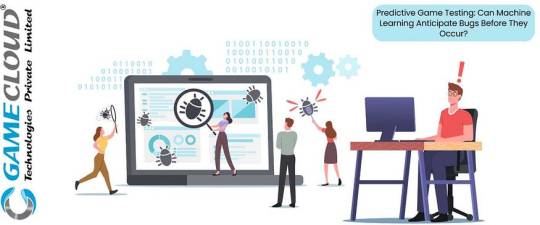
Predictive game testing uses machine learning to identify bugs before they occur, streamlining development and reducing costs. By analyzing past game data, ML models detect patterns linked to bugs, allowing developers to fix issues early. While this approach improves speed and accuracy, challenges like data requirements and false positives remain. Major studios are already integrating predictive testing, and as technology evolves, smaller developers may follow. However, human testers remain essential for gameplay insights. GameCloud continues to combine cutting-edge technology with expert QA to ensure top-quality gaming experiences.
For Know More Contact-Now
For a more detailed: Predictive Game Testing: Can Machine Learning Anticipate Bugs Before They Occur?
0 notes
Text
The Rise of AI Companions: How Artificial Intelligence is Enhancing NPC Interactions in Modern Gaming
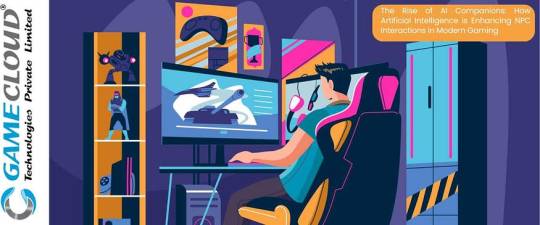
The gaming industry has evolved significantly, particularly in how players interact with non-player characters (NPCs). Traditionally, NPCs followed fixed routines and repeated dialogues, but advancements in artificial intelligence have transformed them into dynamic, responsive companions. AI-driven NPCs can now adapt to player behavior, offer strategic advice, and even exhibit emotions, creating a more immersive gaming experience.
Companies like LolzSoft and Ankatmak.ai are at the forefront of this transformation. While LolzSoft focuses on immersive gaming experiences, Ankatmak.ai is pioneering AI solutions that enhance adaptive NPC behavior and emotional intelligence. Together, they are shaping the future of gaming, merging technology and creativity to redefine player interactions.
For Know More Contact-Now
For a more detailed: The Rise of AI Companions: How Artificial Intelligence is Enhancing NPC Interactions in Modern Gaming
0 notes
Text
Leveraging AI-Driven Playtesting: How Can Automation Transform Game Quality Assurance?
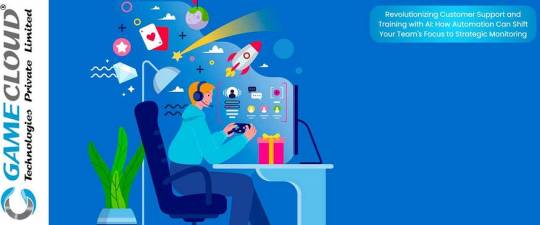
Traditional game testing is time-consuming and error-prone, often missing complex bugs. AI-driven playtesting automates this process, accelerating development while improving accuracy.
Challenges in Manual QA: Human testers bring intuition but struggle with scalability and consistency. Manual testing remains vital for assessing narrative coherence and player experience, but it cannot cover every possible scenario efficiently.
How AI-Driven Playtesting Works: AI simulates player behavior, detects balance issues, stress-tests game performance, and continuously learns from gameplay data. It enhances efficiency by identifying hidden bugs and improving difficulty balance.
Benefits of AI in QA: AI-driven testing reduces QA time by up to 90%, eliminates human errors, lowers costs, and enhances the overall gaming experience. However, it works best when integrated with manual testing, allowing human testers to focus on creative and subjective aspects.
The Future of Game QA: AI in QA is growing rapidly, with major studios adopting automation. The future lies in combining AI with cloud computing and VR testing for immersive experiences.
GameCloud’s Expertise: At GameCloud, we combine AI automation with manual QA expertise to optimize game quality. Our approach ensures technical precision and engaging gameplay.
AI-driven playtesting is a game-changer, but human testers remain essential for delivering polished
For Know More Contact-Now
For a more detailed: Leveraging AI-Driven Playtesting: How Can Automation Transform Game Quality Assurance?
0 notes
Text
Evaluating the Impact of Latency on VR Applications: What Are the Best Practices for Minimizing Motion Sickness?
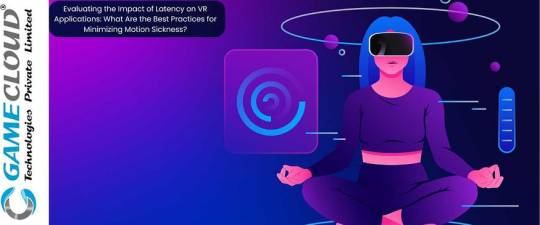
Latency in VR — measured as motion-to-photon delay — can disrupt immersion and cause motion sickness if it exceeds 20 milliseconds. Sensory conflicts arise when visual input lags behind physical movement, leading to nausea.
Best Practices to Reduce Latency:
High Refresh Rate Displays (90 Hz+ for smoother visuals)
Predictive Tracking Algorithms (anticipate movements to cut delays)
Optimized Hardware & Drivers (enhance processing efficiency)
Low Frame Latency in Game Design (foveated rendering for faster performance)
QualityReality by GameCloud ensures top-tier XR experiences through rigorous testing and optimization. As 5G and AI evolve, VR’s future promises lower latency and better comfort.
For Know More Contact-Now
For a more detailed: Evaluating the Impact of Latency on VR Applications: What Are the Best Practices for Minimizing Motion Sickness?
0 notes
Text
The Impact of Artificial Intelligence on Game Development

AI is revolutionizing game development, transforming graphics, gameplay, and player experiences. It enhances visual fidelity through machine learning, automating texture creation and optimizing performance with tools like NVIDIA’s DLSS. AI-powered ray tracing improves lighting effects, while procedural content generation streamlines level design, enabling vast and unique game worlds.
Character animations and NPC behavior have become more lifelike and dynamic, with AI-driven motion synthesis and adaptive responses. AI personalizes gameplay, adjusting difficulty and shaping branching narratives, as seen in games like Detroit: Become Human. It also revolutionizes game audio, enabling AI-generated voice acting and adaptive soundtracks.
Developers benefit from AI-assisted coding, lowering entry barriers for game creation. With continued advancements in machine learning and real-time content generation, AI is set to redefine gaming, fostering innovation and immersive experiences. GameCloud and LolzSoft leverage AI to enhance game testing and development, shaping the future of interactive entertainment.
For Know More Contact-Now
For a more detailed: The Impact of Artificial Intelligence on Game Development
0 notes
Text
Reflecting on 2024: A Year of Technological Breakthroughs

2024 has been a landmark year for technological innovation, with AI, extended reality (XR), and gaming driving transformative changes across industries. AI made significant strides, with the rise of code-free development environments empowering game creators and AI-powered tools like ChatGPT, Google’s Gemini, and Amazon’s advanced models revolutionizing interaction, logistics, and personalization.
GameCloud capitalized on this shift, launching sub-brands such as GamerThrong for game validation, QualityReality for XR and Metaverse solutions, and LolzSoft for creative game development. These initiatives reinforced GameCloud’s commitment to innovation and customer-centric solutions.
For Know More Contact-Now
For a more detailed: Reflecting on 2024: A Year of Technological Breakthroughs
0 notes
Text
How Are Tailored AI Solutions Addressing Industry-Specific Challenges Beyond Generalized AI Models?
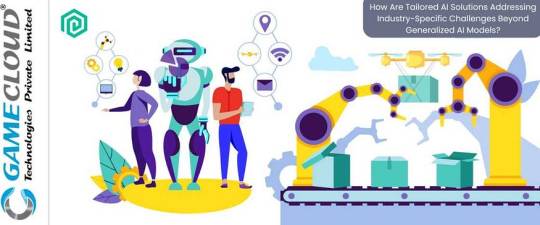
Generalized AI models like GPT-4 offer versatility but often struggle with industry-specific challenges due to a lack of precision and contextual understanding. Tailored AI solutions address these gaps by training on specialized data, enhancing accuracy and relevance. In healthcare, AI improves diagnostics, while in agriculture, it optimizes crop management. Manufacturing benefits from predictive maintenance, and retail gains from demand forecasting. Despite challenges like data collection and regulatory compliance, tailored AI solutions drive innovation and efficiency. Ankatmak, a division of GameCloud, specializes in customized AI solutions, helping businesses navigate technological complexities with precision and creativity.
For Know More Contact-Now
For a more detailed: How Are Tailored AI Solutions Addressing Industry-Specific Challenges Beyond Generalized AI Models?
0 notes
Text
The Science of Motion Sickness in Virtual and Mixed Reality

Motion sickness, or cybersickness, in virtual and mixed reality occurs when visual and vestibular sensory inputs conflict, leading to dizziness, nausea, and discomfort. Factors like latency, low frame rates, and wide fields of view can worsen symptoms. Developers combat this through rigorous user testing, physiological monitoring, and design optimizations, such as reducing latency and adding visual anchors. Gradual exposure and customizable settings further enhance comfort. As VR/MR technology advances, improved motion tracking and haptic feedback promise better experiences. Prioritizing user comfort ensures more immersive and accessible virtual worlds.
For Know More Contact-Now
For a more detailed: The Science of Motion Sickness in Virtual and Mixed Reality
0 notes
Text
Evaluating the Impact of Latency on VR Applications: What Are the Best Practices for Minimizing Motion Sickness?
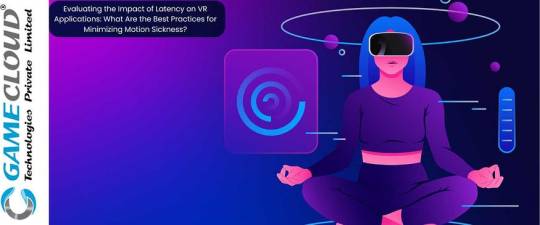
Latency in VR, the delay between a user’s action and system response, plays a pivotal role in the immersive experience. Delays exceeding 20 milliseconds can lead to motion sickness caused by sensory conflicts between visual input and inner ear motion. This is particularly problematic in VR, where even slight mismatches disrupt the user experience.
To minimize latency, solutions include high-refresh-rate displays (90 Hz or higher), predictive tracking algorithms, optimized hardware, and low-latency game design techniques like foveated rendering. GameCloud’s QualityReality team ensures exceptional XR application performance through meticulous testing and quality assurance expertise.
For Know More Contact-Now
For a more detailed: Evaluating the Impact of Latency on VR Applications: What Are the Best Practices for Minimizing Motion Sickness?
0 notes
Text
Leveraging AI-Driven Playtesting: How Can Automation Transform Game Quality Assurance?
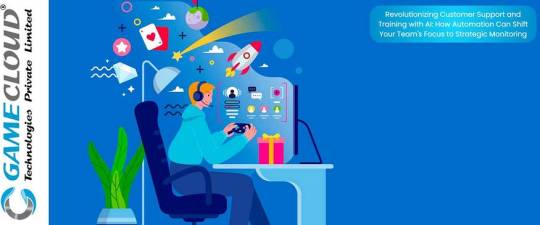
Latency in VR, measured as motion-to-photon delay, significantly impacts the immersive experience, with delays over 20 milliseconds often leading to motion sickness. This phenomenon occurs due to sensory conflict, where visual and physical cues mismatch, causing nausea and discomfort.
To tackle this, developers employ high refresh rate displays (90 Hz or higher), predictive tracking algorithms, and optimized hardware and software. Techniques like foveated rendering also enhance performance by focusing on rendering where the user looks.
GameCloud’s QualityReality division excels in ensuring flawless XR experiences through comprehensive quality assurance, supporting developers in crafting immersive, low-latency applications.
For Know More Contact-Now
For a more detailed: Leveraging AI-Driven Playtesting: How Can Automation Transform Game Quality Assurance?
0 notes
Text
What Challenges Does Biometric Integration Present in the Future of XR?
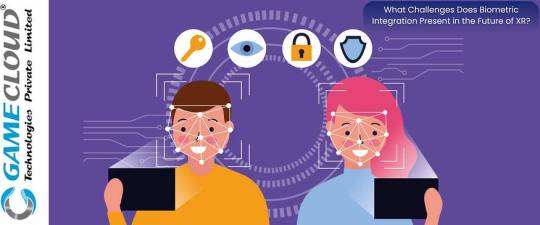
Biometric integration in XR technologies promises unparalleled personalization through eye tracking, facial recognition, and motion analysis. Yet, it presents critical challenges in privacy, security, ethics, and regulation. Sensitive biometric data, like eye movements and gestures, can reveal personal insights, raising concerns about misuse and privacy breaches. Additionally, storing and transmitting this data introduces significant security risks, as it cannot be altered if compromised.
GameCloud is committed to overcoming these hurdles by delivering cutting-edge testing solutions for XR, ensuring secure, immersive, and user-centric experiences. With robust standards and collaborative efforts, the future of XR can achieve the ideal balance between innovation and trust.
For Know More Contact-Now
For a more detailed: What Challenges Does Biometric Integration Present in the Future of XR?
0 notes
Text
How Are Blockchain-Based Loyalty Programs Transforming Digital Promotions and Consumer Trust?

Blockchain technology is revolutionizing traditional loyalty programs by addressing key challenges like transparency, trust, and efficiency. Traditional programs often leave customers frustrated with unclear policies and restricted point usage. Blockchain’s decentralized ledger ensures transparency, allowing users to track and verify rewards independently, fostering trust.
Interoperability is another game-changer, enabling customers to exchange points across various platforms. For instance, points earned at a grocery store could be used for hotel bookings, creating a unified rewards ecosystem. Additionally, blockchain prevents fraud and enhances security with encrypted, tamper-proof transactions, safeguarding sensitive data and boosting customer confidence.
At Promocious, a GameCloud division, we specialize in innovative digital promotions, leveraging cutting-edge strategies to elevate brands and connect with audiences.
For Know More Contact-Now
For a more detailed: How Are Blockchain-Based Loyalty Programs Transforming Digital Promotions and Consumer Trust?
0 notes
Text
What Challenges Does Biometric Integration Present in the Future of XR?
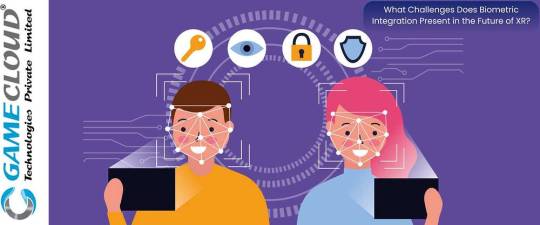
Biometric integration in XR enhances immersion through features like eye tracking and facial recognition but presents significant challenges. Privacy concerns arise as sensitive data can reveal personal details such as emotional states or health conditions. Additionally, data security risks loom large, with biometric data being a prime target for cyberattacks, making robust encryption vital. Ethical dilemmas around transparency and consent further complicate adoption, while the lack of unified regulations adds to the complexity.
At QualityReality, we ensure excellence in XR testing by prioritizing security, usability, and innovation. Balancing progress with ethical considerations is key to shaping a trustworthy XR future.
For Know More Contact-Now
For a more detailed: What Challenges Does Biometric Integration Present in the Future of XR?
0 notes
Text
What Ethical Challenges Arise from Hyper-Targeted Promotions in a Data-Driven Era?
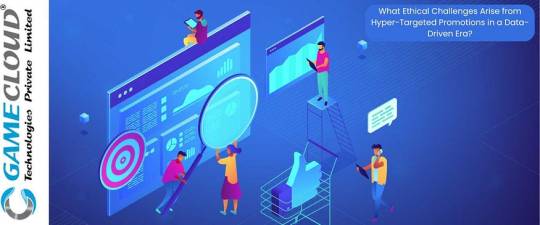
Hyper-targeted promotions offer unparalleled personalization but raise ethical concerns. Privacy issues emerge as extensive data collection often occurs without transparent consent, leading to mistrust. Discrimination risks arise when targeting algorithms unintentionally exclude certain groups, reinforcing biases. Additionally, manipulation of consumer behavior threatens autonomy, exploiting vulnerabilities for profit.
Transparency and ethical practices are essential for addressing these challenges. Clear communication about data use, robust protection measures, and inclusive targeting can balance personalization with consumer trust. At Promocious, GameCloud’s digital promotions division, we champion responsible strategies to help brands engage audiences effectively and ethically.
For Know More Contact-Now
For a more detailed: What Ethical Challenges Arise from Hyper-Targeted Promotions in a Data-Driven Era?
0 notes
Text
What Impact Do Player-Centric Data Models Have on Predicting Long-Term Engagement in Games?
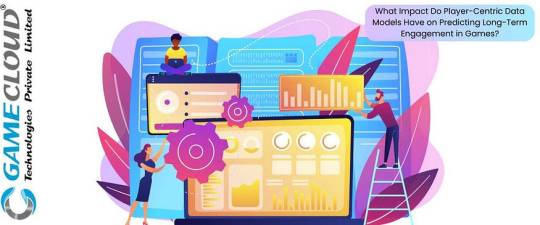
Through AI-driven insights, games adapt dynamically — whether by adjusting challenges, tailoring rewards, or enhancing matchmaking for competitive play.
Ethically, developers must balance personalization with privacy, transparency, and inclusivity, ensuring data enhances rather than exploits the gaming experience.
At GamerThrong, GameCloud bridges developers and gamers, empowering players to shape the future of immersive gaming.
For Know More Contact-Now
For a more detailed: What Impact Do Player-Centric Data Models Have on Predicting Long-Term Engagement in Games?
0 notes
Text
Stress Testing in Modern Game Development: Preparing for Global Multiplayer Scalability
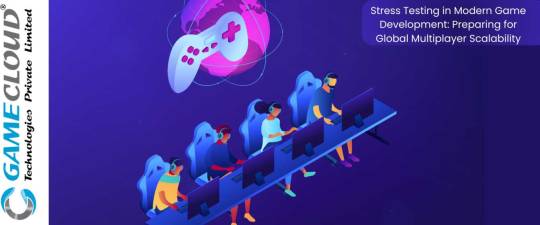
Developers conduct stress tests throughout development to simulate high player loads and assess performance under various conditions. This proactive approach helps identify and resolve issues before going live, enhancing player experiences.
GameCloud specializes in high-quality game testing and QA services, helping developers create reliable and engaging games. By prioritizing stress testing, developers can ensure their games thrive in an increasingly competitive landscape, providing seamless multiplayer experiences for players worldwide.
For Know More Contact-Now
For a more detailed: Stress Testing in Modern Game Development: Preparing for Global Multiplayer Scalability
0 notes
Text
Making Games for India: Embracing Local Insights
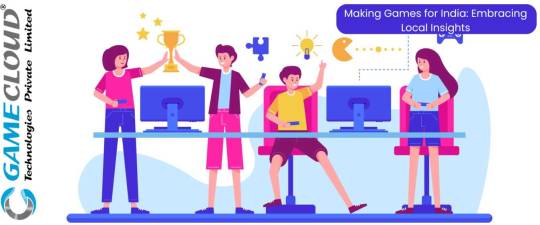
Monetizing the Indian audience poses challenges due to differing cultural and economic dynamics. Developers need to implement creative monetization strategies tailored to local preferences, focusing on in-app purchases, advertisements, and culturally relevant content.
Success in India requires games that resonate with local culture, using regional languages and themes to foster emotional connections with players. At LolzSoft, a subsidiary of GameCloud Technologies, we aim to create joyful and immersive gaming experiences.
As India’s gaming market continues to grow, understanding its nuances is essential for developers looking to thrive in this competitive space. The time to focus on India’s gaming revolution is now. For more insights, read the full blog.
For Know More Contact-Now
For a more detailed: Making Games for India: Embracing Local Insights
0 notes